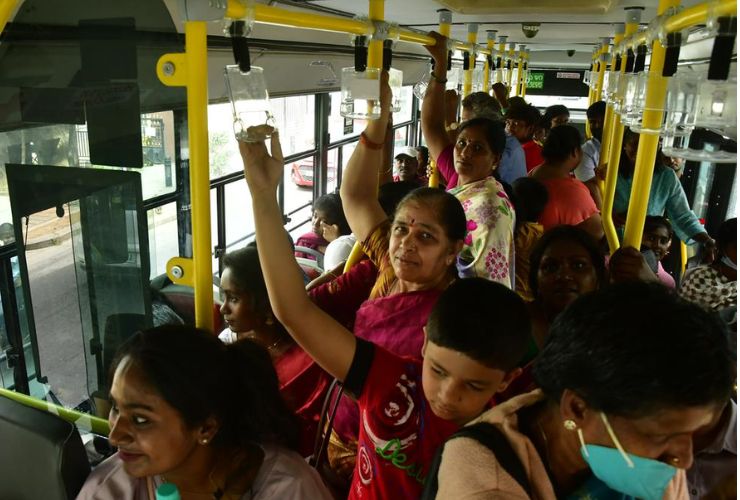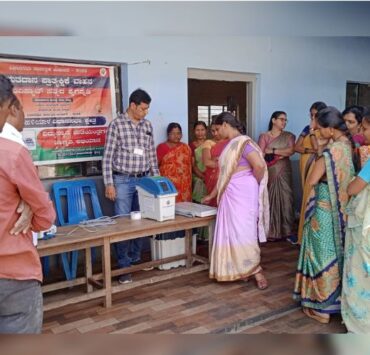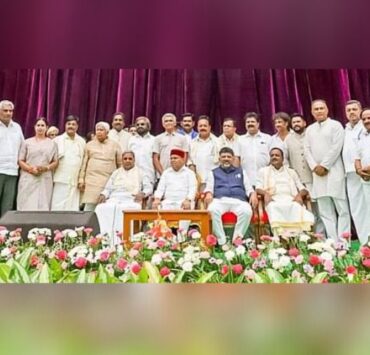
By Nayantara Narayanan

transport. Photo courtesy: K. Murali Kumar /The Hindu
The poll promise that women in Karnataka are most likely to see fulfilled is that of free transport—to a greater or lesser extent. The Bharatiya Janata Party (BJP), the Congress and the Aam Aadmi Party (AAP) have offered the lowest of hanging fruit to win over Karnataka’s women voters in the upcoming state elections by promising free bus travel to at least some of them. In its manifesto the BJP has made the same promise that its government had made earlier this year in the state budget—free bus travel to 30 lakh women working in the organised sector of labour. The AAP has promised free city bus travel to all women. The Congress has the most expansive promise on transport for women: free bus travel for all women on all state and city public transport routes.
It is an easy promise for political parties to make and a relatively low-cost one for a government to implement. The BJP government made a budget allocation Rs 1,000 crore for the scheme, which is a small fraction of the money that is spent on other development works and certainly better spent than on statue-building exercises. Offering free transport to women makes sense on many counts, not just in terms of the broad aim of making their commutes safer.
As political and civic activist Tara Krishnaswamy wrote after the Karnataka budget was announced, female labour force participation in the state is just about 25%, compared to 57% for men. Moreover, the wage gap between men and women is 33%, with women also taking on the worst-paying and/or unpaid jobs. In fact, free transport only for women working in the organised sector, as the BJP has promised, or women commuting within cities, as the AAP has promised, leaves out women who need free transport the most—the vast majority who work as informal labour, who not only earn the least but have irregular incomes.
Among the other major promises in party manifestos are allowances to women from poor families under various heads. The BJP has promised to match deposits on fixed deposits up to Rs 10,000 under a scheme for women of SC and ST households. The BJP, the Congress and the AAP have all promised to increase pension for widows from Rs 800 to Rs 2,000 per month, while the JDS has promised an increase to Rs 2,500.
The Congress has listed in its manifesto a scheme that will provide Rs 2,000 every month to women heads of families. The AAP has promised an “empowerment allowance” of Rs 1,000 to every woman above the age of 18 from a family living below the poverty line (BPL). The AAP’s big poll promise to women is 33% reservation in government jobs.
Among the most important female workers in the country are those enrolled under various care programmes of the government: Accredited Social Health Activists (ASHAs), Anganwadi (rural child care centre) workers, mid-day meal scheme workers and Pourakarmikas (street sweepers). These women workers hold up the various health, nutrition, sanitation and education programmes of the state and were also among the frontline workers during the COVID 19 pandemic, undertaking great personal risk to provide the necessary services.
ASHA workers across the country have held protests in recent years, sometimes in their respective states and sometimes coordinating nationwide strikes, for their right to earn minimum wages, to avail social security benefits and to earn pensions. Pourakarmikas employed for sanitation by the municipal corporation in Bengaluru have held several protests recently against being enrolled on contracts instead of being made regularised employees, with job security and related benefits.
The BJP manifesto envisions improvements to state programmes. For example, it promises the distribution of nutritional kits and folic acid supplements, as well as financial assistance, to pregnant women. But it is largely silent on the workers who will implement these improvements. The Congress promises subsidies for electric scooters to frontline health workers, increased honorariums for ASHAs and midday meal cooks, increased monthly salaries and retirement benefits for Anganwadi workers and regularisation of employment for Pourakarmikas along with hazard pay, insurance cover and special housing. The JDS has mentioned raising honorariums for anganwadi workers and helpers and making anganwadi workers permanent employees with a monthly salaries of Rs 5,000 as well as pension after 15 years of service.
During earlier elections women have felt largely ignored as voters. Before the 2019 general elections, I met women working in the Bengaluru’s garment industry—a sector characterised by low wages and poor working conditions. Several times over the years they had approached the Karnataka government, asking for the mandated minimum wage to be hiked. Despite the promises made by various governments led by different political parties, their wages have remained largely static. About 90% of the six lakh workers in the garment industry comprise women. One worker told me at the time that the reason they were ignored was that no party or government took women seriously as a voting bloc.
Similarly, women in Raichur district in north Karnataka have complained of having a major demand ignored over the years. Groups of women here have held large agitations—before state and general elections to get politicians’ attention and otherwise—asking for a complete ban on alcohol in the state. This is due to alcoholism among men resulting in both rampant domestic violence and depletion of household savings. This large group comprising women from hundreds of villages in the district have felt unseen and unheard as a political force due to the lack of any reaction from any political party.
This time, too, the parties’ manifestos ahead of the state elections offer only incremental benefits to women. And then there is the question of how many of the promises included in manifestos will remain on paper, or be partially or unsustainably implemented or underfunded.
Major manifesto promises aimed at women
BJP
- Free bus pass to 30 lakh women – organised sector workers and girl students.
- Scaling up folic acid distribution to children and pregnant women.
- Industrial clusters in every district with a dedicated revolving fund of Rs 500 crore as viability gap funding for women-led enterprises in those clusters.
- Hostels for working women and female students in Hubli, Belagavi, Kalaburgi, Mysuru, Mangaluru, Tumakuru and Davangere in Public-Private Partnership (PPP) model.
- Suraksha Janani Bharavase kit to every pregnant woman, which will include 6 nutritional kits and financial assistance worth Rs 21,000.
- Increase in pension for widows from Rs 800 to Rs 2,000 per month.
- Shishu Viharas in all industrial clusters and construction sites through the PPP model.
- Onakke Obavva Samajike Nyaya Nidhi, which will have matching deposits of up to Rs 10,000 for deposits made under the scheme by women of Scheduled Caste and Scheduled Tribe (SC, ST) households.
Congress
- Rs 2,000 every month to women heads of families.
- Support to 5,000 women entrepreneurs every year.
- 20% land in industrial parks for women-run businesses.
- All female employees in the transportation sector to be assigned only day shifts.
- Increased allocation of funds to Stree Shakti Sanghas.
- Establishment of 100 working women’s hostels.
- Increase of widow pension to Rs 2,000.
- Rs 50 lakh grant to gram panchayats that elect women representatives.
- Free motor vehicle training, subsidised autos and cars for female school dropouts.
- Free travel for all women throughout the state on regular KSRTC/BMTC (state/city) bus routes.
- Increased recruitment in the police force, from to 33% for women and 1% for gender minorities.
- Special fast track courts for crimes like rape and acid attack.
- Promotion of agro-based village industries run by women with a Rs 200 crore investment.
- Skill development centres for women farmers in Raitha Mitra Kendras
- Formation of a committee to look into demands of garment workers and revise minimum wages for them.
- Regularisation of all 25,000 Pourakarmikas, along with hazard pay, Rs 10 lakh insurance cover and a special housing scheme.
- Mimimum hourly wages for gig and unorganised workers in domestic and personal care, logistics, food delivery, etc.
AAP
- 33% reservation for women in government jobs.
- Free city bus transport for women.
- Rs 1,000 per month empowerment allowance for every BPL woman above 18 years.
JDS
- Loans taken by Stree Shakti Groups to be waived.
- Rs 6,000 allowance for pregnant women for six months.
- Hike of widow pension from Rs 900 to Rs 2,500
- Raising honorariums for anganwadi workers and helpers
- Regularising anganwadi workers with a monthly salary of Rs 5,000 as well as pension after 15 years of service




